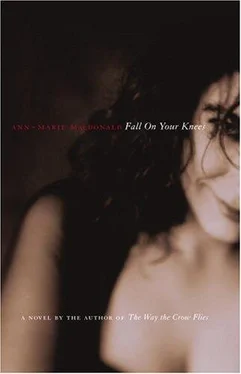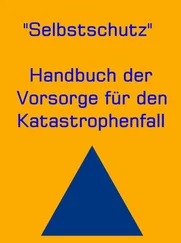To whom can she confess? Not to her dear friend, Mrs Luvovitz. She tries to tell the priest. “Father forgive me for I have sinned, I brought the war.” But he tells her she’s guilty only of the sin of pride; “Say the rosary three times and ask God for humility.” So Materia goes unabsolved. She visits the cliff every day in her mind and every day she swan-dives off it, weightless for a moment, feeling the slim girl she used to be, then the sudden satisfying impact of the rocks. It’s where she belongs, she craves the caress of the violent shore, to come alive like that once more in a clash of stone and then to die. Peace. But she has her little girls, and suicide is the unforgivable sin.
In the fall of 1917, Our Lady appears to three children in Fátima, Portugal, and tells them three secrets, the third of which remains a Vatican secret to this day. But Materia knows what the third secret was. It was this: “Dear children; I sent the Great War in order to shield, a little longer, the body and soul of Kathleen Piper.”
Now we wear the feather, the 85th feather ,
We wear it with pride and joy .
That fake Advertiser, Old Billy the Kaiser ,
Shall hear from each Bluenose boy .
Where trouble is brewing, our bit we’ll be doing ,
To hammer down Briton’s foes ,
With the bagpipes a-humming, the 85th coming ,
From the land where the maple leaf grows .
85TH OVERSEAS BATTALION, CEF
It must mean something, there are so many of us — never have so many sacrificed so much for so little. It must mean something, otherwise there would not be this parade; there would not be this royal inspection, these brassy buttons, these slender wounds in the earth across Europe, these sturdy beams holding back the tide of mud and human tissue, this meticulous network of miniature mines, these lice, these rats, these boots returning unto dust, these toes lying scattered about my feet, like leaves, like fallen teeth.
James has spent three years in a narrow strip of France and Flanders, dodging snipers in order to collect the dead and comfort the dying. He is not a medic, he just volunteers a lot. Wiring parties, digging parties, reconnaissance parties, one big party. The streamers, fireworks and ticker tape that sent them off are nothing compared to the bright bits of men that sail through the air and festoon the remaining trees here in the land of permanent November. These decorations will stay up for years.
Chloride of lime to kill the stench, cordite to kill the lice, whale oil to keep the feet from rotting. Fifty-four days at a stretch in the flooded mass grave of the living but he never complains. James has prolonged the lives of so many men that he has been mentioned in dispatches several times. Originally he was recommended for the Victoria Cross, but as the Great Adventure dragged on his brand of “conspicuous gallantry” reflected poorly on the war.
Once, a wrecked man called him Mummy and clutched at the buttons on James’s chest. Nothing was surprising. James let the boy from Saskatchewan suck on one of his brass buttons before dying. The Mother Country.
The mud between the opposing trenches is known as No Man’s Land. This is a reasonable name for a stretch of contested ground that has yet to be won by either side. But James and possibly a number of others along the line have forgotten that this is the origin of the name. The name has come to mean a haunted foggy expanse of silent slime. A limbo — grey, yellow, green, mostly grey, and empty except for the dead. Rats may scamper across it and remain rats. Birds may fly above it and remain birds; they may alight and tear and eat and prick up their heads to stare motionless and beady for a moment before pecking and eating again, and remain birds. But no man may venture into this space between the lines and remain a man. That is the difference. No man may enter, either stealthily on his belly alone, or noisily on two feet racing through glue with a thousand versions of himself firing, falling, on either side as far as the eye can see, and remain a man. It is possible to become a man once more if you make it back behind your line again, but you suspend your humanity for your sojourn in between. That is why the place is called No Man’s Land.
By 1916 James had volunteered so often that other men assumed he had a death wish. Either that or he was protected — by an Angel of Mons, perhaps, or Old Nick. They didn’t know whether it was lucky to stick close to James, or if that was asking for the next bullet that missed him by an inch. Before a night raid or a dawn attack, when other men were tucking Bibles into their left breast pockets, kissing love letters or a lucky rat’s paw, James was relaxed against a reeky sandbag full of mud and pieces of former men, reading.
James’s first act of “total disregard for his own safety” was in the fall of 1915. Five men had gone out after dark with their bouquets of barbed wire, and four came back, but no one had heard a shot or a shout. That meant the fifth man was out there lost, wandering around in the place of no reference points. German Very lights bloomed in the sky from three directions, adding confusion to danger. Briefly lit, a shattered tree, a sea of craters, corpses interchangeable, now pink, now bronze, now blue. On the western front there is nothing so colourful as the night. James went out after the fifth man. He wasn’t a friend, he was just some fella.
After two hours he found the man walking towards the German line. James brought him in, but he didn’t make friends with him or anyone else.
On Christmas Day 1914, the British and the Germans had laid down their arms, climbed out of their trenches, and walked into No Man’s Land. They met halfway between the lines, and exchanged gifts. Not so strange, considering that never before had so many nice men with families and decent jobs volunteered to face each other under arms across distances as brief and static as twenty yards. Such chocolate. Such bully beef. The truce was completely spontaneous and not repeated in anything like those numbers again — somehow people can still get into the Christmas spirit when they’ve only been mowing each other down with ordinary bullets, but the festivity goes right out of the season once they’ve gassed each other. Nonetheless, James brought over a gift on the Christmas of 1916.
At night you tell yourself that the howls and whimpers out there are wild dogs. This gets difficult if one of the dogs starts praying. The night before Christmas, James had already brought in two wounded and he was out looking for another. By the light of a flare he saw two dead stretcher-bearers lying at either end of a stretcher containing a bandaged man — an unusual sight in that the dead were whole. As the flare died, James saw the man on the stretcher stir. He approached but found the man was dead after all — a feast for the rats that had turned him over in the course of their meal. James carried on, blind-man’s-buff, listening for any sound that was not a rustling or a gnawing. He stopped and crouched over a whimper. He felt for arms, legs, and guts (if the guts are merely exposed, it’s worth picking him up; otherwise, finish him off quietly). This man was in pretty good shape, though unable to walk, and when he answered James’s “How ya doin, buddy?” with “Ich will nicht sterben, bitte,” James picked him up and walked east. When they got close to the German trench, the man cried out to his comrades, “Nicht schiessen, nicht schiessen!” James laid him down within arm’s reach of the parapet, turned around and walked back to his own side.
James could do all this because he had made a bargain with himself: he wouldn’t try to get killed, nor would he try to survive. He could do all this because he felt terribly sorry for the men he rescued. They harboured the saddest and most foolish desire of all. The desire to go on living.
Читать дальше












